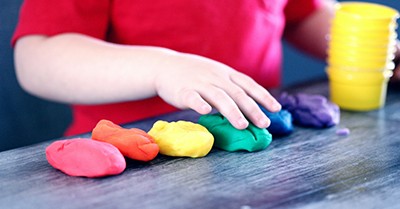Here’s a thoughtfully curated list of 20 autism-friendly activities that align beautifully with inclusive early childhood practices. These ideas support sensory regulation, communication, emotional development, and agency—while being playful and engaging for all children.
Sensory & Creative Play
- Sensory Bins – Fill tubs with rice, pasta, or kinetic sand and add scoops, cups, or themed objects.
- Scented Playdough – Add calming scents like lavender or citrus for a multi-sensory experience.
- Finger & Footprint Painting – Encourages expression and body awareness.
- Calm-Down Bottles – Children can shake and watch glitter settle to self-regulate.
- Slime or Oobleck Play – Great for tactile exploration and cause-effect learning.
Cognitive & Communication Boosters
- Emotion Cards – Use visuals to explore feelings and build emotional vocabulary.
- Sorting Activities – Sort by color, shape, or texture to support categorization and focus.
- Simple Board Games – Turn-taking games like “First to Match” or “Roll & Build” support social interaction.
- Books Featuring Neurodiverse Characters – Foster empathy and representation.
- Shadow Puppet Theater – Encourages storytelling and imaginative play.
Movement & Regulation
- Yoga Ball Activities – Rolling, bouncing, or balancing helps with proprioception.
- Animal Walks – Bear crawls, crab walks, or frog jumps build coordination and fun.
- Nature Walks with Scavenger Hunts – Calm, structured exploration of the outdoors.
- Dance & Freeze Games – Combine movement with listening skills.
- Balancing Beam (Tape on Floor) – Enhances focus and gross motor control.
Social & Emotional Development
- Empathy Role Play – Use dolls or puppets to act out social scenarios.
- Feeling Toolbox – Let children choose tools (e.g., fidget, weighted toy, breathing card) to manage emotions.
- Music Jam Sessions – Explore rhythm and sound with instruments or household items.
- Gardening Together – Planting and watering builds responsibility and connection to nature.
- Quiet Corners with Choice Boards – Empower children to choose calming activities when overwhelmed.
Why Are These Activities Autism Friendly?
These activities are considered autism-friendly because they’re thoughtfully designed to support the unique sensory, social, and emotional needs of children on the autism spectrum. Here’s why they work so well:
Predictability & Structure
Many autistic children thrive in environments that are predictable and low in ambiguity. Activities like sorting games, yoga ball exercises, or nature walks offer clear routines and outcomes, which help reduce anxiety and build confidence.
Sensory Regulation
Sensory sensitivities are common in autism—some children seek sensory input, while others avoid it. Activities like sensory bins, calm-down bottles, or slime play allow children to engage with textures, sounds, and visuals in a controlled, soothing way.
Communication & Social Skills
Visual tools like emotion cards or puppet play help children express feelings and understand social cues. Structured games and role-play scenarios provide safe opportunities to practice turn-taking, empathy, and collaboration.
Emotional Regulation
Tools like a “feeling toolbox” or quiet corners with choice boards empower children to self-regulate and make choices when overwhelmed. These strategies promote independence and emotional awareness.
Strength-Based & Inclusive
These activities often tap into children’s interests and strengths, whether it’s music, movement, or visual storytelling. They’re flexible enough to be adapted for different developmental levels, making them inclusive for all learners.
Further Reading
Supporting Children With Autism In Early Childhood Setting
Autism In Children
References:
Engaging Autism Activities, Rori Care
Autism-Friendly Group Activities, Kids First Services
Inclusive Activities For Children With Autism, Autism Core







 Open ended questions cannot be responded to with one word answers such as yes or no. These types of questions enables a child to provide
Open ended questions cannot be responded to with one word answers such as yes or no. These types of questions enables a child to provide During your child’s preschool years, an important milestone begins to emerge. This is the development of pre-writing skills. Pre-writing skills are used to encourage, develop
During your child’s preschool years, an important milestone begins to emerge. This is the development of pre-writing skills. Pre-writing skills are used to encourage, develop Open ended materials enables children to play freely. They are objects that have no rules to follow, use or function. Raw materials that can be
Open ended materials enables children to play freely. They are objects that have no rules to follow, use or function. Raw materials that can be An Acknowledgment of the Country is a way of showing respect for the Traditional Owners and can be given by both non-Indigenous people and Aboriginal
An Acknowledgment of the Country is a way of showing respect for the Traditional Owners and can be given by both non-Indigenous people and Aboriginal Language plays an important role in a child’s development. It enables a child to communicate effectively with their family, learn at school, socialize with friends,
Language plays an important role in a child’s development. It enables a child to communicate effectively with their family, learn at school, socialize with friends, Like adults, children have to deal with their own stress in life. Moving house, starting a new school, preparing for a new sibling - these are
Like adults, children have to deal with their own stress in life. Moving house, starting a new school, preparing for a new sibling - these are Playdough is such a versatile material. It provides numerous benefits to children as they manipulate it, it is safe and soothing and provides children with
Playdough is such a versatile material. It provides numerous benefits to children as they manipulate it, it is safe and soothing and provides children with Teaching children about sustainability enables them to appreciate and respect the natural environment. Early childhood services can provide meaningful hand on learning experiences in order
Teaching children about sustainability enables them to appreciate and respect the natural environment. Early childhood services can provide meaningful hand on learning experiences in order Recycling is an important concept that teaches children to care for the environment. It encourages children to be responsible and show a growing appreciating for
Recycling is an important concept that teaches children to care for the environment. It encourages children to be responsible and show a growing appreciating for When children apply paint to paper, glue things together, or pound a lump of clay, they experiment with colour, shape design and texture.
When children apply paint to paper, glue things together, or pound a lump of clay, they experiment with colour, shape design and texture.



